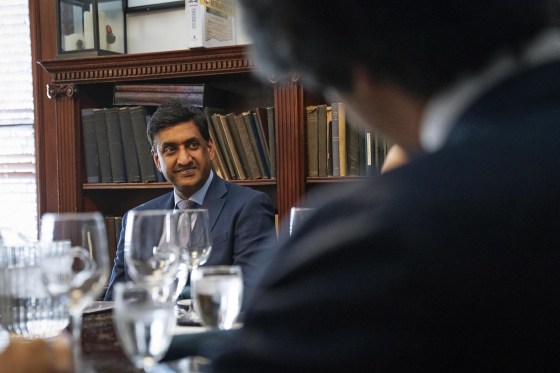NEW HAVEN, Conn. — Rep. Ro Khanna, D-Calif., tossed out the question casually as he huddled with two dozen Yale Law students here this week: Who are your favorite Democrats?
“Present company excluded,” clarified Khanna, who was on campus to excoriate Vice President JD Vance and has been sending signals that he might like to run for president in 2028.
There were ripples of support for “AOC” — Rep. Alexandria Ocasio-Cortez of New York., who, like Khanna, has close and ideologically progressive ties to Sen. Bernie Sanders, I-Vt. Someone else mentioned Sen. Andy Kim of New Jersey, an answer that pleased Khanna.
“Sen. Kim doesn’t get a lot of limelight,” Khanna said, “but he’s very, very solid.”
Khanna’s interest in such dialogue is instructive as he evaluates which Democratic leaders still carry influence, studies the party’s prospective presidential field for 2028 and determines whether he will join it.
Khanna, eager to further engage the law students Tuesday, pressed on.
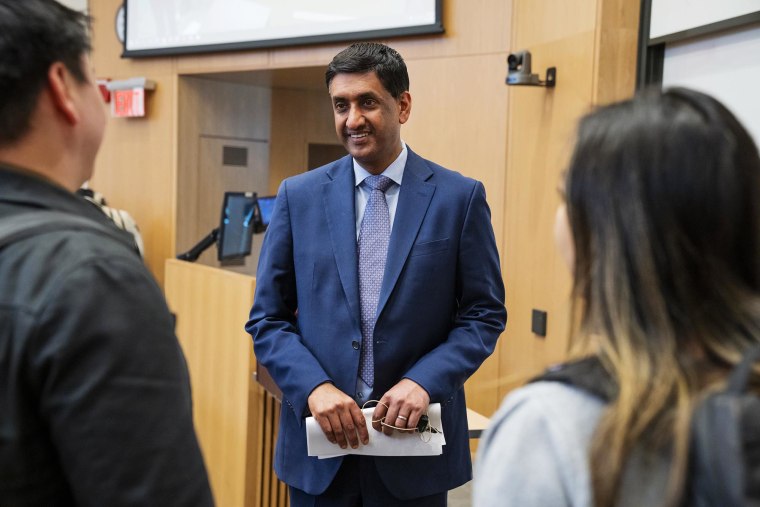
Anyone for Sanders?
There were a few polite murmurs of approval.
“Obama?” Khanna asked.
There were a few dismissive laughs at the former president’s name — and at least one pair of rolled eyes.
One woman brought up Michigan Gov. Gretchen Whitmer’s recent travails. Her visit with President Donald Trump last week turned into an unexpected Oval Office photo op that Whitmer briefly attempted to hide from by covering her face with some blue folders.
“Everyone has moments that they would rather not have, and I don’t think it’s going to impact her long term,” Khanna said of Whitmer, adding that if she chooses to seek the White House in 2028, as many believe that she might, “she would be a formidable candidate.”
Khanna, 48, sees himself as one of the Democratic Party’s next-generation leaders. His alliance with Sanders, whose 2020 presidential campaign he co-chaired, established him with the party’s progressive activists, but he remains largely unknown outside Washington, D.C., and his Silicon Valley-based district. He has been traveling the country, pushing “economic patriotism” and “pro-growth progressive” policies while holding conversations like these with party leaders, laborers and other voters in an effort to raise his national profile.
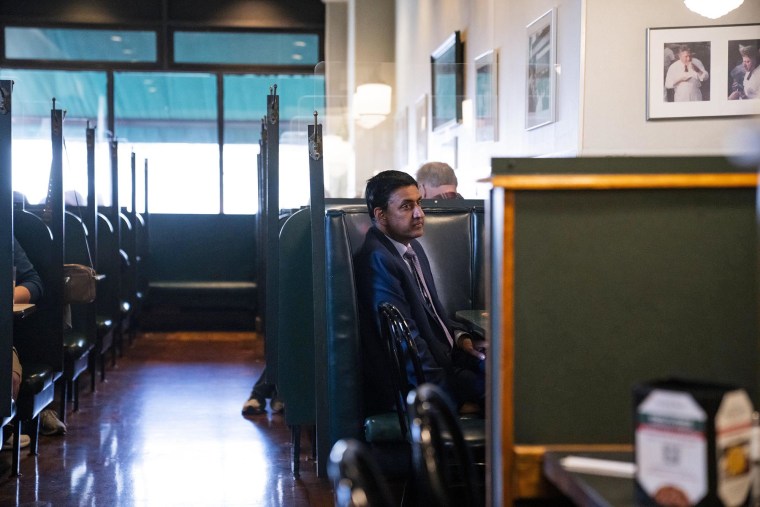
A few hours after meeting with those students, it was Khanna, speaking with reporters on campus, fielding the questions and offering additional observations on his fellow Democrats.
He mentioned Sanders’ recent rallies with Ocasio-Cortez that have drawn large crowds and been seen by some as a passing of the progressive torch. He mentioned the marathon speech delivered by Sen. Cory Booker of New Jersey. He had a shoutout for Maine Gov. Janet Mills, who has been emerging as a leading voice opposing the second Trump administration.
But what about Whitmer, whose has made efforts to cultivate a working relationship with Trump? And what about California Gov. Gavin Newsom, who on his new podcast has been chopping it up with far-right Trump allies such as Charlie Kirk and Steve Bannon? Khanna initially tiptoed around those questions, hewing carefully to a talking point he offered several times that day during his meetings at Yale — that anyone interested in being a voice of the party must “push back” strongly on Trump and Vance.
Does he believe Newsom’s podcast strategy accomplishes that? Newsom’s conversation with Kirk, for example, was perhaps most notable for the governor’s break with other Democrats by arguing that it is “deeply unfair” for transgender girls and women to participate in women's sports.
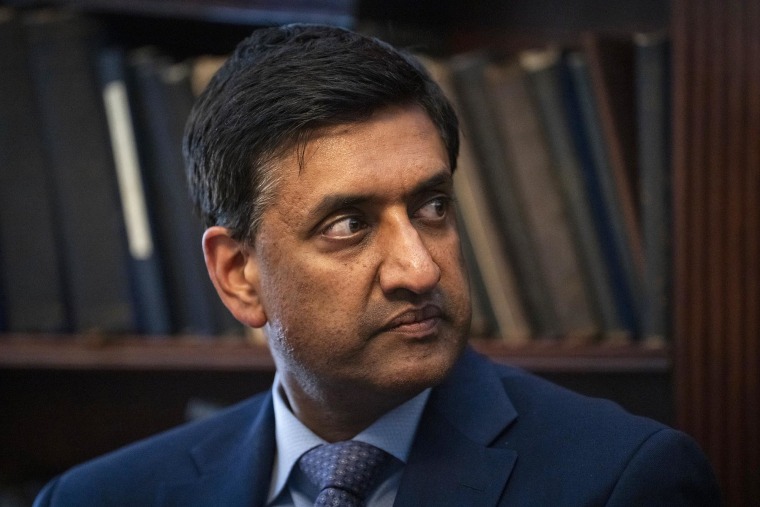
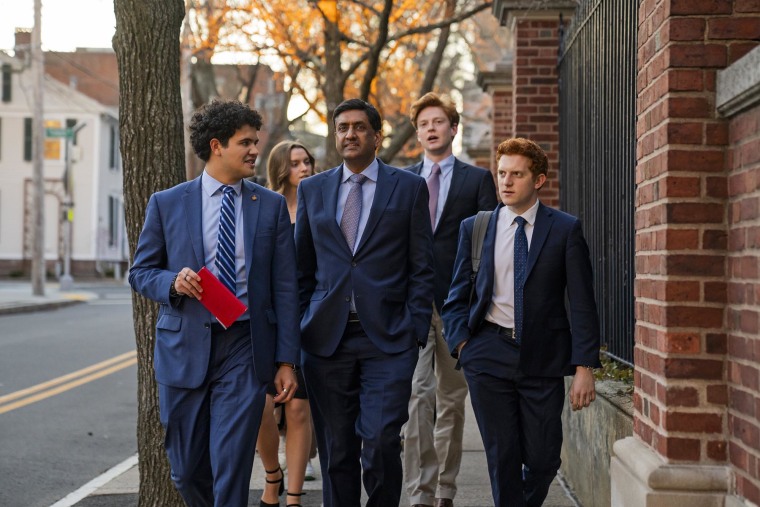
“I’m all for having conversations, but I think it needs to be conversation with pushback. So, if you’re going to go and talk to Charlie Kirk, then ask him about some of the statements he’s made that are supporting white supremacists,” Khanna said. “Look, I went on Megyn Kelly’s platform and got eviscerated … for defending transgender rights.”
Khanna said he believes it’s important for Democrats to have “10 to 15 to 20 new voices” emerge ahead of the 2028 primaries.
“I think both the people who offer the most positive ideas going forward and the people who offer the most substantive opposition are going to be positioned to lead the party,” he said. “Our party became stale. The same personalities. The same talking points. The same consultants. And I’m excited that you’ve got a lot of new voices that are emerging.”
But Khanna also acknowledged it’s tough for progressive newcomers and outsiders to break through in a party where the establishment remains powerful. Joe Biden won the Democratic nomination — and the presidency — in 2020 despite challenges from Sanders and others on the left. Vice President Kamala Harris quickly sewed up the nomination in 2024 after Biden ended his re-election campaign and endorsed her and other party leaders followed suit.
“I mean, I was a co-chair of Bernie’s campaign. It would be naive to think that outsiders who are trying to push the boundaries with new ideas and new people aren’t going to be underdogs,” Khanna said. “But my sense is the thing that the party desperately needs is those outsiders.”
That prompted another question: Does Khanna want Harris to run for president again in 2028? He didn’t directly answer, but he spoke encouragingly about Harris running for governor instead.
“I think there’s a fair amount of support in California to be governor, and I’d be surprised if she didn't clear the Democratic field if she ran for governor,” Khanna said. “In terms of whether she wants to run for president again, that’s such a personal decision. I mean, if she feels like she’s the best person to lead the country in 2028, then she should run, and then the American people decide. But I would never tell someone whether to run or not to run. I think the only reason to run for president is if you think you’re the best person at that moment to lead the country."

